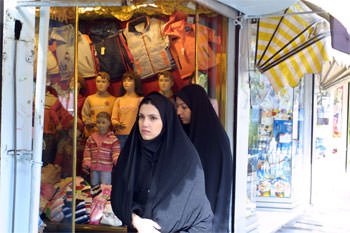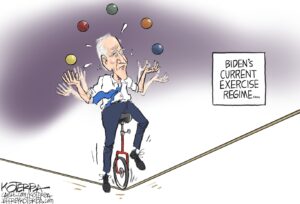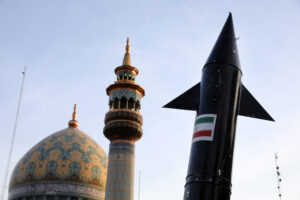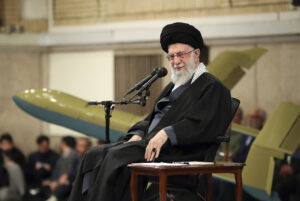Iranians Skeptical About U.S.-Tehran Dialogue
Award-winning journalist Reese Erlich discovers that everyday Iranians favor talks between America and Tehran, but most think the negotiations will amount to little more than window dressing.
Award-winning journalist Reese Erlich discovers that everyday Iranians favor talks between America and Tehran, but most think the negotiations will amount to little more than window dressing.
TEHRAN — Washington beltway insiders speculate that if only the United States opened talks with Iran and Syria, it might be able to escape the Iraq quagmire. But based on interviews with Iranians, such a hope appears to be a pipe dream.
The Iraq Study Group and some advisors to President Bush have suggested opening negotiations as a means to stop Iran and Syria’s support for various factions in Iraq’s civil war. So far the Bush administration has rejected such calls. But even if the U.S. tries to open talks, Iran is likely to drive a hard bargain. Iranian authorities calculate that the U.S. will remain bogged down in both Iraq and Afghanistan. And unlike a U.S. public polarized along party lines, the Iranian government enjoys considerable popular support on this issue.
Ordinary Iranians, interviewed at random in Tehran, favor a dialogue between the two countries but tend to side with their leaders on what that dialogue might accomplish.
As Ali Mohammadi cranked open the awning on his small grocery store in a working-class neighborhood of south Tehran, he noted that the U.S. faces tremendous problems in Iraq and said it will eventually have to withdraw its troops. “The problem of Iraq will be solved,” he said.
In another part of south Tehran, Masoud Rezaei sells colorful cotton cloth at a small fabric store. He was pleased with the Republican defeat in the U.S. midterm elections. “There’s a 90 percent possibility of improving relations as a result of the elections,” he said.
The optimists in Iran say if Washington and Tehran successfully negotiate their differences in Iraq, then the two governments could tackle the much more difficult issue of Iran’s development of nuclear power and enriching uranium.
Other Iranians argue that there’s little immediate chance of improving relations. Shirin Ebadi, winner of the 2003 Nobel Peace Prize and a leading human rights activist in Tehran, noted that President Mahmoud Ahmadinejad’s long letter to Bush last May had little impact. “I’m not expecting any tangible changes in U.S.-Iran relations,” she said.
Even strong critics of Iran’s clerical government say the U.S. hasn’t taken advantage of recent possibilities to improve relations. In 2001, for example, Iran cooperated with the U.S. to overthrow the Taliban in Afghanistan. Ebrahim Yazdi, former Iranian foreign minister and now a leading critic of the government, said Iran had helped bring together various Afghan factions to wage war against the Taliban.
“The U.S. government did not use that opportunity to resolve the outstanding problems,” he said. Therefore he doubts “if U.S. authorities really want to resolve problems with Iran.”
Ahmadinejad enjoys considerable popular support in his confrontations with the U.S.
In random interviews in various parts of Tehran, residents universally supported Iran’s right to develop nuclear power, enrich its own uranium and defy a U.N. resolution against doing so.
Interviewed at a middle-class shopping mall, homemaker Mahin Husseini said she supports Iran’s experimental efforts to enrich uranium. “We shouldn’t rely on other countries to give us the technology,” she said.
Opposition leader Yazdi said the Bush administration’s focus on the nuclear issue and its statements that a military attack against Iran is still “on the table” only solidify public opinion in support of conservative President Ahmadinejad. Iranians rally round their government in times of international crisis, he noted, just as Americans did after Sept. 11. Iranians are particularly outraged that the U.S. has allocated $85 million to “democratize” Iran, according to Yazdi, because that’s a code word for overthrowing the government.
Iranians remember all too well the last time the U.S. “democratized” Iran. In 1953 the CIA overthrew the democratic government of Prime Minister Mohammad Mossadegh and replaced him with the brutal dictator Mohammad Reza Shah Pahlavi.
“Democracy cannot be imported or exported,” said Yazdi. “American soldiers don’t carry democracy in their backpacks. It has to come from within.”
In fact, said Yazdi and other leading opponents of the government, Bush administration policies are counterproductive.
“When the U.S. government uses harsh words against Iran or the government allocates money to overthrow the regime, the authorities in Iran use that to suppress the opposition,” Yazdi said.
The U.S. should drop the nuclear issue and join with other countries to politically pressure Iran to improve human rights, according to Nobel laureate Ebadi, who noted that political repression has gotten worse under the Ahmadinejad administration. The government has increasingly closed newspapers, arrested political prisoners and beaten peaceful demonstrators.
“The U.S. government shouldn’t militarily attack Iran,” said Ebadi. “The Americans should pay more attention to the human rights issues in Iran.”
Back at the shopping mall, homemaker Husseini fills her shopping cart with housewares. She supports her government’s positions but remains optimistic. In the long run, she said, the two countries can resolve their differences.
“It’s better if Iran and U.S. have friendly relations,” she said. “I don’t want to see more wars.”
Reese Erlich is an award-winning freelance foreign correspondent. His book “The Iran Agenda: What the US Government Doesn’t Want You to Know” will be published next September.
Your support matters…Independent journalism is under threat and overshadowed by heavily funded mainstream media.
You can help level the playing field. Become a member.
Your tax-deductible contribution keeps us digging beneath the headlines to give you thought-provoking, investigative reporting and analysis that unearths what's really happening- without compromise.
Give today to support our courageous, independent journalists.






You need to be a supporter to comment.
There are currently no responses to this article.
Be the first to respond.